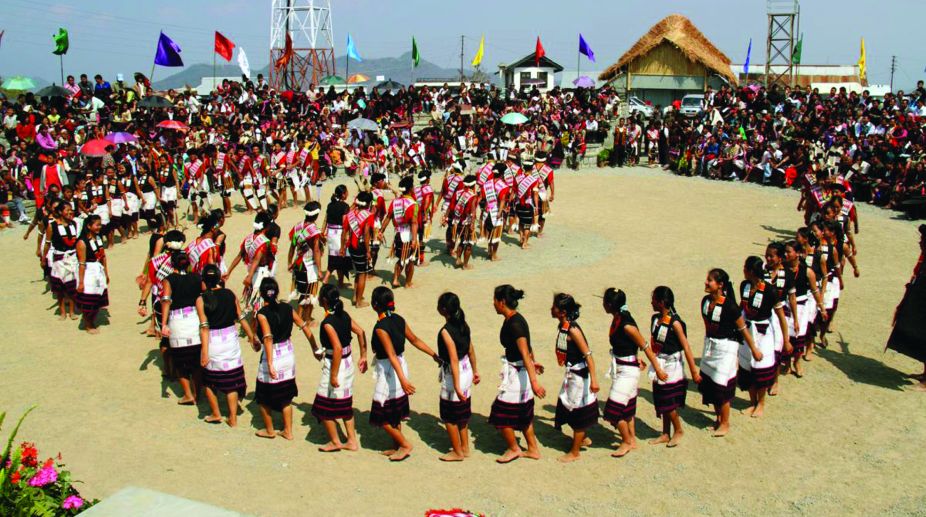Union Ministers, former Chief Minister compete in Northeast in first phase of election
Among the contenders, Union Minister Kiren Rijiju stands as a formidable force, vying for the Arunachal West seat.

Every person is special in her own right, in her own world, and indeed nature has never differentiated between people. With the advent of widespread industrialisation, modern societies witnessed immense progress, but it remained confined to few regions. Others were untouched owing to various reasons, topography being one of them. Flat regions were blessed enough to be developed into cities owing to factories and other establishments finding the task of construction time-bound and cost-effective.
The disparity between regions isn’t just confined at the country level; within one country, regions with difficult terrain often remain underdeveloped. India recognises a number of its states as special category states, mostly on grounds of challenging terrain and presence of tribal groups. States in the North-east are categorised as such and are recipients of special sops including larger allocation of Central funds in policy implementation, alongside the Constitutional guarantee to safeguard the culture and traditions of tribes.
In 2001, the government established an independent ministry for the development of the North-eastern region and budgetary allocations to this ministry are reflective of government’s commitment. Industries that set up their businesses in the North-eastern states are eligible for special concessions. Autonomy has also been given for local governance with members from tribal groups made a compulsory part of governance.
Advertisement
What else can one expect at the government level? Still, the wide gap in terms of per capita income that exists between the states of the North-east and developed regions of India is noticeable and deserves concerted endeavours.
But these measures are to be taken at an altogether different level. Sensitising the rest of India towards citizens of North-eastern states and their culture and language are actions that can truly empower these regions. Many young people from the North-east migrate to ‘mainstream’ regions of the country for want of work opportunities. They end up in large cities including Delhi, Mumbai and Bangalore where had the local populace been tolerant and compassionate enough, these youths wouldn’t have faced denunciation.
No two people from different geographical regions look alike. One can easily differentiate between inhabitants from Europe, Africa, South Asia and Southeast Asia. Not just the colour, even the shape of eyes and foreheads vary. In terms of appearance, inhabitants of North-eastern states resemble people from nearby countries more than they do people in the rest of India.
For a mother of a daughter from a North-eastern state, it is difficult to comprehend why and how her daughter would face resistance upon her migration to ‘mainstream’ India. She might not even know how people would address her daughter with defamatory epithets owing to her appearance and speech. For her, the daughter is ambitious and willing to relocate in an unknown territory for the sake of providing financial support to the household. To her, the host society ought to be welcoming and accommodating.
The harsh reality, however, is many girls from North-east states when they venture into big cities get trapped into trafficking owing to the shoddy law and order situation that favours the rich and influential. In a country where grievances of “locals” often fall on deaf ears, one can imagine the hardships of those who are rarely accepted as members of the same society, mostly treated as second-class citizens.
India’s struggle with its own people as not being tolerant of those from other regions is longstanding. A society that is so deeply divided in terms of caste and culture is further fragmented when someone who looks and sounds different moves in, based on a belief in the constitutional guarantee of free movement anywhere within the country.
Cases of African nationals being physically assaulted in north India are not unheard of. These foreigners have recurrently complained of being rejected in their campuses and workplaces on the basis of their skin colour. The Hindustan Times, a national daily, recounted the ordeal of these foreigners and those treated as foreigners within their own country – people from North-eastern states – in its series titled ‘Let’s talk about Racism’. The stories were a reflection of how rude and biased we can be to those we deem outsiders.
The fact is we, based in developed cities, compartmentalise people who we see as strangers. Those from African countries are labeled as drug pedlars and criminals, even worse is the case with those from North-eastern states.
One never realizes that even our ancestors may have belonged to different lands, migrated to where we are today for financial advances and then gained the tag of being ‘locals’. One does see the invaluable contribution of Mahatma Gandhi in our struggle for independence, but fails to notice that the same Mahatma stood firmly against apartheid while practicing law in South Africa.
We must realise that our governmental agencies are doing their job; almost the entire rural India is said to have been electrified lately, impoverished households are now entitled to free LPG connections and roads and infrastructure are being developed in the North-eastern states. But what we as common citizens, indeed as ‘locals’ in developed cities, are doing is not in line with the idea of inclusive development and equitable distribution of national income.
Migrants from North-eastern states only add to the labour force of our cities and act in different capacities such as merchants and consumers to help our local economies grow. The Mahatma, whose face adorns our currency notes, is the man who taught us to be inclusive, principled and unprejudiced.
In every respect, the mother in the North-east deserves an assurance that her child in the distant city will not face resistance and bias. It is time we decide on welcoming our fellow Indians, not compartmentalising them.
The writer is a chartered accountant and has served on the boards of several public sector banks.
Advertisement